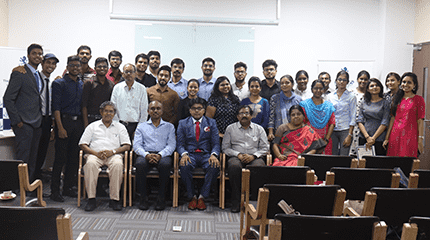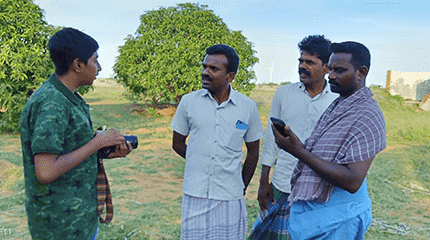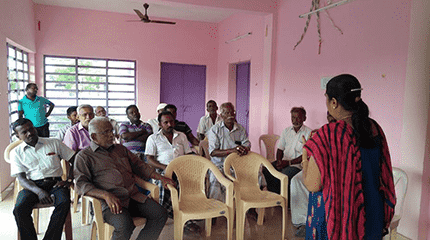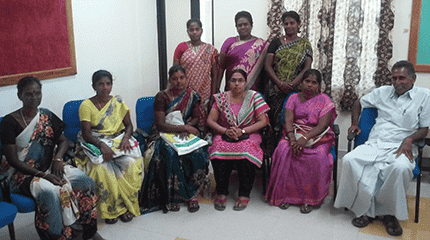KOVISE FOUNDATION CONFLICT RESOLUTION INTERNATIONAL (KFCRI)

Kovise Foundation Conflict Resolution International (KFCRI) was established in the year 2016, under the aegis of KOVISE FOUNDATION to disseminate the required Research and Development of Conflict Resolutions thereby facilitating peace and economic balance with effective resolution of all categories of disputes in socio, economic and political arena worldwide administering Alternative Dispute Resolution (ADR) mechanism with Institutional Framework along with long term capacity building programmes seeding globally.
KFCRI is a first of its kind institution providing in ADR Practice Accreditation in all aspects of ADR as well as maintains a functioning administrative centre to manage and empower a Dispute Resolution mechanisms used by clients worldwide.
Know More Visit kfcri.org
KOVISE FOUNDATION CHAMBER OF AGRICULTURE (KFCOA)

Agricultural Education Imparting traditional and scientific knowledge in agriculture practices from production to marketing of agriculture products with intervention of innovative technology and legal adaptability wherever applicable.
Networking KFCOA member networks thrives as a way to pool ideas, exchange perspectives, offer moral and technical support, and share resource leads with each other.
Market-Led Agriculture Adopting new farming approaches involving productivity to profitability, subsistence to commercial agriculture, local market to export market, mono cropping to crop diversity and so on.
Agriculture Arbitration Opting Arbitration for dispute resolution in Agriculture commodity and trade.
Know More Visit kfcoa.org
KOVISE ECOVERSITY

KOVISE FOUNDATION with utmost care for the society and mankind initiate the
Himalayan task of promoting the value of education mainly based on the learning ideology of
Sri.Rabindranath Tagore. The paramount objective is to make the fundamentals of life to
reach the core society with clear thoughts and ideas. In this mission KOVISE ECOVERSITY
facilitates by sowing the seed of NEED BASED PEDAGOGY. The world of learning
specific to the Renaissance has become imminent due to fundamentals being carried away by
advance knowledge.
KOVISE ECOVERSITY is providing the platform to all who are interested to learn through
exploration. It emphasizes on freedom of learning on the beneficiaries proposal. KOVISE
ECOVERSITY imbibed the informal learning ideology of Sri Rabindranath Tagore who
made a reform in freedom of education.
The founder of KOVISE FOUNDATION, Mrs.Surya Narmada, follower of Sri Rabindranath
Tagore’s education ideology conducted many trainings in the field of agriculture and the
results were overwhelming. The same is tried to be repeated in our schools.
THOUGHTS OF SRI RABINDRANATH TAGORE ON LEARNING SYSTEM:
Sri Rabindranth Tagore’s ideology emphasis to absorb and learn subconsciously at one’s own
pace, giving them a self-motivated open model of education concerning the importance of
freedom in education. He also recognised the importance of the arts for developing
understanding and compassion, and the necessity for a cherished relationship with one’s
cultural and natural environment. He saw learning as a medium for appreciating the
prosperous aspects of other cultures, while maintaining one’s own cultural specificity. We
always believe in a learning system which leads to aspiration giving freedom of power in our
language, creativity, balancing with our environment, finally freedom from ignorance. In
general, he envisaged an education that was deeply rooted in one’s immediate surroundings
but connected to the cultures of the wider world, predicated upon pleasurable learning and
individualized to the personality of the child. He felt that a curriculum should revolve
organically around nature with classes held in the open air under the trees to provide for a
spontaneous appreciation of the fluidity of the plant and animal kingdoms, and seasonal
changes.
KOVISE ECOVERSITY initiated two types of Schools:
FARM SCHOOL
Farmers are the nerve line of our nation and their empowerment is the need of the hour to
make them self-sustained. Farmers and rural youth should have an awareness on the current
trend in agriculture and also has to be taught on the basics of scientific agriculture technique
and reasons for adapting the same. This will empower them and the labour can be put into
efficient usage. At the same time it is the need of the hour to strengthen the farmers in other
agriculture and rural related activities so that they can source out income during lean season
of agriculture.
Know More Visit kfcoa.org
INFED SCHOOL
INFED SCHOOL of KOVISE ECOVERSITY also encourages informal learning
programme of the human beings through discussions, mentorship and explorative learning
thereby bringing meaningful personal and social development. We facilitate such learning
systems by connecting them to the subject matter specialist of their field of interest.
PHOTO MIRAGE

A good snapshot keeps a moment from running away.
Photo Mirage, a photo club an initiative of KOVISE was made by Mr.Krishnan Soundarrajan and Master. Pranav Inbavijayan and officially launched on 14 November 2016. The members of this photo club shall concentrate on capturing rural life and landscapes and environmental related issues in their lens in India and worldwide.
Photos are accepted with respect to rural landscapes, technologies and nature and environment India and Worldwide. Photos for photo mirage page can be exclusively submitted to [email protected]
KOVISE FOUNDATION RURAL EVOLUTION CENTRE (KF REC)

KOVISE FOUNDATION plans to set out a beautiful future for India's countryside by establishing Model Rural Centre. It is been our long term goal to transform our rural areas into places with thriving businesses, pleasant living environments, social etiquette and civility, effective governance and prosperity.
- • Efforts will be made to nurture agriculture through industrial development, and use urban development to drive rural development.
- • Progress will be accomplished in rural education, increasing farmers' income, facilitating the employment of rural labor force as well as preserving and refining rural culture.
- • Rural residents should continue to fulfill and spread core socialist values, promote moral education, and pass down the essence of traditional rural culture.
- • Attention will be paid to the quality of poverty reduction, while consideration will be given to increasing people's confidence in their own ability to lift themselves out of poverty and helping them acquire knowledge.
- • The first model REC will be established in our native village Seelathikulam of Tirunelveli District.




